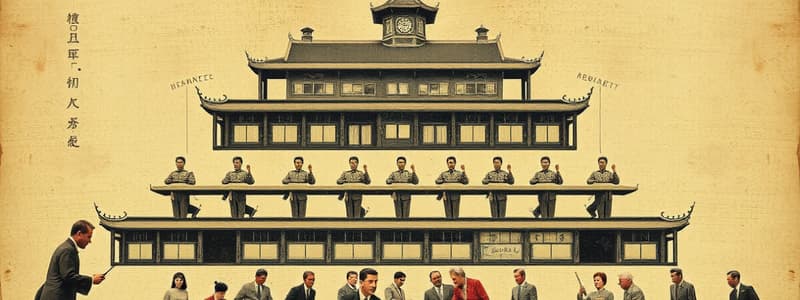Podcast
Questions and Answers
What is one significant value emphasized in Chinese culture that reflects respect for elders?
What is one significant value emphasized in Chinese culture that reflects respect for elders?
- Ancestor worship (correct)
- Collective decision-making
- Individualism
- Social equality
What system describes the common working hours for many employees in China before it was declared illegal?
What system describes the common working hours for many employees in China before it was declared illegal?
- Flexible hours
- 8-5 workweek
- 996 system (correct)
- Remote work model
Which practice is commonly performed before moving to a new office in Chinese culture?
Which practice is commonly performed before moving to a new office in Chinese culture?
- Salary discussions with management
- Blessing ceremony with offerings (correct)
- Team building exercises
- Formal introductions to staff
What role does seniority play within Chinese companies?
What role does seniority play within Chinese companies?
What does Guanxi (关系) signify in Chinese business culture?
What does Guanxi (关系) signify in Chinese business culture?
What is one aspect of Feng Shui in Chinese culture?
What is one aspect of Feng Shui in Chinese culture?
How do Chinese employees often demonstrate their dedication to work, despite the legality of the 996 system?
How do Chinese employees often demonstrate their dedication to work, despite the legality of the 996 system?
Which belief reflects the role of superstitions in Chinese culture?
Which belief reflects the role of superstitions in Chinese culture?
What was the primary focus of Confucius's teachings?
What was the primary focus of Confucius's teachings?
How did Confucianism influence the political structure during the Han Dynasty?
How did Confucianism influence the political structure during the Han Dynasty?
In what way does Confucianism differ from other major religions?
In what way does Confucianism differ from other major religions?
What does Confucius suggest as essential for building a stronger society?
What does Confucius suggest as essential for building a stronger society?
Which aspect of life did Confucius's teachings provide guidance on?
Which aspect of life did Confucius's teachings provide guidance on?
What did Confucius believe about rituals in society?
What did Confucius believe about rituals in society?
What type of relationships did Confucianism prioritize among individuals?
What type of relationships did Confucianism prioritize among individuals?
What influence did Confucianism have on Chinese culture that persists today?
What influence did Confucianism have on Chinese culture that persists today?
Flashcards are hidden until you start studying
Study Notes
Cultural Values and Hierarchical Structures
- Ancestor worship and filial piety are core values in Chinese culture, emphasizing respect for elders.
- Chinese companies often operate with a strict hierarchical system featuring numerous leadership levels.
- Seniority greatly influences workplace dynamics; employees adhere to formal protocols when interacting with superiors.
- Employees typically wait for permission to speak in the presence of a boss and tend to refrain from speaking before they are acknowledged.
Meeting Etiquette
- In meetings, the team leader from China commonly initiates interaction with the counterpart's boss before any discussions proceed.
Superstitions and Feng Shui
- Superstitions influenced by beliefs in luck, fate, and intuition are prevalent in Chinese culture.
- Feng Shui focuses on arranging environments to optimize the flow of positive energy, health, and prosperity.
- It is customary to perform blessing ceremonies before moving to new offices, including rituals involving offerings like incense and fruits.
Work Ethic and Labor Practices
- Education and hard work are highly valued, with families investing heavily in their children's education for a better future.
- The "996 system" implies a work schedule of 9:00 am to 9:00 pm, six days a week (72 hours total) which was deemed illegal by the government in 2021.
- Despite its illegality, many employees adhere to unpaid overtime to signal dedication and distinguish themselves at work.
Business Culture and Guanxi
- Personal trust and relationship building are crucial components of the Chinese business culture, encapsulated by the term Guanxi (关系).
- Guanxi is characterized by the expectation of reciprocal favors; offers of assistance are made with the anticipation of future exchanges.
- This culture fosters strong, long-lasting relationships, playing a significant role in business negotiations and opportunities in China.
Overview of Confucianism
- Confucianism is a philosophy and way of life, significantly impacting ancient Chinese culture and influencing it today.
- Founded by Confucius, who lived from 551 to 479 B.C.E. during a time of political instability in China.
Confucius and His Teachings
- Confucius was both a philosopher and political figure who aimed to restore traditional principles through his teachings.
- His philosophy combined older religious precepts with guidelines for social behavior and ethics.
- Addressed all aspects of life, emphasizing family interactions, public conduct, educational standards, and governance.
Core Principles
- Focused on humanism, promoting the idea of treating others as one wishes to be treated.
- Believed that fulfilling roles and obligations with respect would strengthen society and governance.
- Highlighted the importance of rituals to express mutual dependence among individuals and entities.
Distinction from Religion
- Confucianism is considered a philosophy rather than a religion due to its lack of focus on supernatural concerns like the afterlife or deities.
- Although it includes discussions of religious rituals, the primary emphasis is on ethical conduct and social harmony.
Historical Influence
- Became the dominant political philosophy during the Han Dynasty (206 B.C.E. - 220 C.E.).
- The conservative nature of Confucian teachings reinforced the status quo, aligning with state interests to maintain social order.
- The legacy of Confucianism continues to shape Chinese society through its emphasis on rituals, respect for family and ancestors, and self-discipline.
Studying That Suits You
Use AI to generate personalized quizzes and flashcards to suit your learning preferences.




